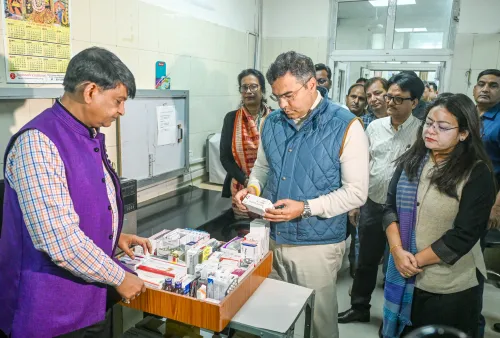Can AI Transform India's Healthcare Landscape?

Synopsis
Key Takeaways
- AI can revolutionize healthcare in India.
- Over 25 real-world applications of AI are highlighted.
- AI could triple India's GDP by 2035.
- Key challenges include data fragmentation and workforce readiness.
- Collaboration among healthcare providers is essential for success.
New Delhi, Nov 18 (NationPress) Artificial Intelligence (AI) has the potential to revolutionize the healthcare sector in India by addressing systemic challenges and enhancing outcomes, a recent report states.
Published by KPMG in partnership with FICCI, the report outlines a strategic framework for the responsible and objective-driven implementation of AI in Indian healthcare.
Highlighting over 25 practical applications of AI across various healthcare functions, the report showcases its role in self-care, health management, primary and hospital care, operational management, rehabilitation, remote care, telehealth, and public health policies.
According to projections by NITI Aayog, AI could potentially triple India's GDP by 2035, with healthcare identified as a key sector.
The report also tackles significant issues such as data fragmentation, ethical considerations, governance, and workforce preparedness, providing a comprehensive plan for AI integration across clinical, operational, and public health areas.
“This document delves into AI’s transformative capacity to connect vast untapped data and disparate systems into a cohesive, intelligent network that provides personalized and effective care,” stated Lalit Mistry, Partner and Co-head of Healthcare at KPMG in India.
“Healthcare providers in both public and private sectors can realize substantial value and efficiency through AI-driven transformations, leading to improved care and outcomes,” Mistry further emphasized.
The future of healthcare will require unprecedented collaboration among various healthcare settings and professionals.
“Tomorrow’s healthcare will not only be intelligent in an artificial sense but will also integrate seamlessly. With AI at its foundation, individuals, services, and providers will come together to reimagine care, enhancing human capabilities rather than replacing them to achieve smarter, more connected healthcare outcomes,” the report articulated.
“This report serves as a guide for healthcare administrators in both public and private sectors to explore AI’s potential across healthcare value chains, supported by essential enablers and safeguards for successful AI-driven transformations,” it concluded.










